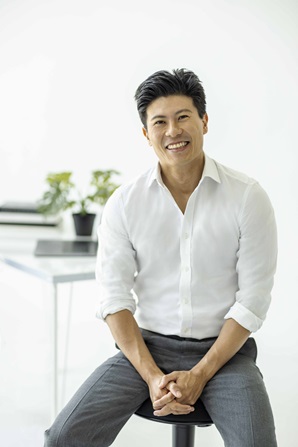
Investing in a sustainable future with Jenn-Hui Tan
Jenn spent six years with Norton Rose Fulbright working in London and Asia before moving to Fidelity International where he is Chief Sustainability Officer.

When did you work at Norton Rose Fulbright and in what team?
I joined the firm as a trainee in January 2001. I qualified into what was then Corporate Finance team 3 led by Raj Karia, Laurence Levy and Mark Bankes. I moved to the Hong Kong office in April 2006 and worked there for 18 months until I left for an in-house role in November 2007.
What are your favourite memories from your time with the firm?
I really enjoyed my time at the firm and, having only ever worked there and now for Fidelity International, Norton Rose Fulbright holds a special place in my memory. I worked out of Kempson House which was nothing like the shiny glass buildings of today. It had this old-school charm about it with large traditional desks and piles of papers everywhere.
My favourite thing has to be the people I met – it was just a wonderful place to start my career. The training and learning were first rate as you would expect from a top tier firm but I did not think I would meet so many fantastic people. I actually met my wife who was also a trainee at the firm and I am still in touch with many of the close friends I met there.
I had the opportunity to work in the Hong Kong and Singapore offices, both of which locations I loved and ended up returning to later in my career. There was also one particular transaction in 2003 involving the debt restructuring of a power station which was very intense for an extended period of time - I look back fondly now but perhaps not so much at the time.
Was there anyone who particularly inspired or helped you in your career?
There were many inspirational people at the firm. I still remember my interview with Patrick Farrell, to whom I am grateful for giving me a chance and my first seat with Richard Calnan, an amazing font of knowledge and source of calm. I learnt a lot from all of the partners and associates I worked with, and I was particularly lucky to be part of a close-knit intake of fellow trainees, two of whom remain with the firm to this day: Marianne McMahon and Hannah Meakin.
Where has your career taken you since leaving Norton Rose Fulbright?
I joined Fidelity International in Hong Kong in November 2007 and been here ever since although I have had a number of different roles. I started off as in-house lawyer doing transactional work for the investment team. In 2010, I moved into the investment team in a capital markets role looking at private investment opportunities and IPOs. My focus then switched to encouraging better corporate governance practices with the companies we invest in and that evolved into broader sustainability work - the E and the S as well as the G.
What do you enjoy and what are the challenges in your role?
Working at an investment manager is a great opportunity to learn about businesses all around the world, big and small, from smart people ultimately trying to figure out whether they will be successful. My piece of the investment puzzle is exploring how companies impact, and are impacted by, broader sustainability issues like climate change, nature loss and social inequality. The physical implications of climate change, as well as the global policy response to these implications, are becoming increasingly felt in the real world and in financial markets, and this will accelerate in the coming years. Investment analysis needs to take account of these risks, as well as to take advantage of opportunities presented by the low carbon transition. Another fast-emerging problem is that of nature loss, and particularly loss of biodiversity, the living component of nature. In the last 50 years, global wildlife populations have declined by nearly 70% and climate change and deforestation are accelerating that rate of loss. More than half of global GDP is dependent on nature, including key sectors like construction, agriculture and pharmaceuticals - yet there continues to be a large disconnect between the price we pay for nature and the value we derive from it.
While this space has existed for some time, it has only recently become mainstream and in some markets, has become a necessary part of doing business. At the same time, it has attracted significant interest and scrutiny, from regulators, politicians and clients. Sustainable investing is still evolving and the challenge is to navigate these expectations while making sure we still deliver on our core proposition: the long-term financial needs of our customers.
What is the best piece of advice you have been given in your career?
The best advice I’ve received has generally been context-specific, relevant to that time and place. That said, a Barack Obama interview has particularly resonated with me. His first advice was: be kind and be useful. If you’re both, people will enjoy working with you and seek you out. As President, he had many sophisticated people describe a problem to him - why something went wrong or why something couldn’t be fixed. But what he was looking for was that one person who would say, no matter how small or big the problem is, I’ll take care of it – that is being useful. His second piece of advice was that it’s better to focus more on what you want to do than who you want to be - if you’re absorbed in what you’re doing, you’ll get good at it and the journey will have been a good one.
How do you relax when you are not working?
I have three school-age children so I mostly relax by driving a bread loaf-shaped car from one activity to another on weekends. I've always loved music - all kinds of music - although sadly I have no talent for it (as those who frequented Karaoke Box on Frith Street back in the day may unpleasantly recall), so I limit myself to listening and occasionally, shuffling.
